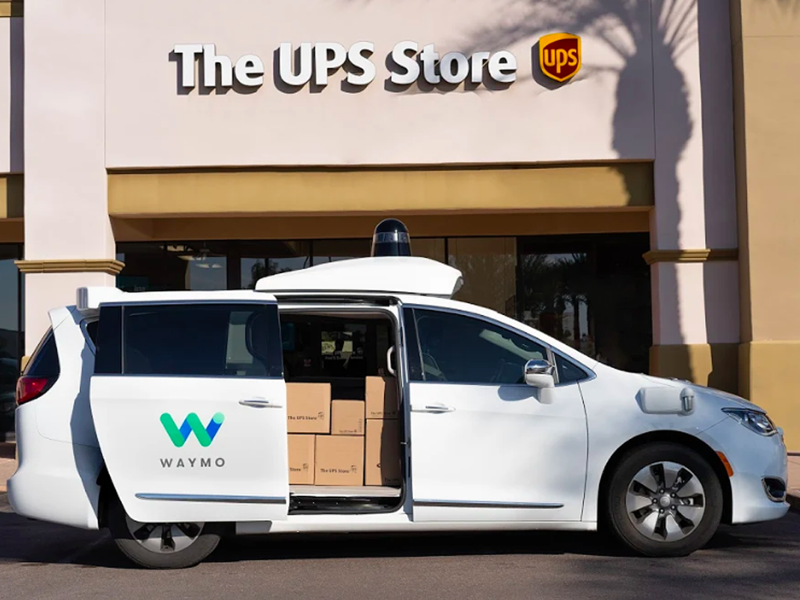
There’s no more iconic vehicle in the delivery realm than the boxy, brown trucks United Parcel Service uses to distribute packages throughout the world.
They’re about to get some company in the fleet.
Waymo soon will carry packages for UPS using its self-driving Chrysler Pacifica minivans, the two companies said Wednesday. In a pilot project expected to begin this quarter, Waymo will use its minivans to ferry packages from multiple UPS stores in the metro Phoenix area to the logistics company’s operational hub in nearby Tempe, Ariz.
It’s a small-scale start to identify operational efficiencies that can be gleaned using autonomous vehicles to carry those packages, similar to the pilot project Waymo conducts with AutoNation to deliver car parts. At least for now, human safety drivers remain in the vehicles.
What differs is the extent to which Waymo will modify the Pacificas. While they remain in standard passenger configurations for AutoNation, Waymo will remove the seats and install netting for its UPS pilot, transforming vehicles traditionally known as family haulers into full-fledged delivery vans.
The number of vehicles involved in the partnership has not yet been determined. At least for now, human safety drivers remain in the vehicles.
But in a logistics industry fascinated by the potential of self-driving systems, the fledgling partnership teems with long-term potential. Waymo affirmed as much, saying, “Our team will work closely with UPS with the goal of jointly developing a long-term plan.”
Whether that plan might someday involve Waymo installing its self-driving system on the big, brown trucks utilized by drivers who drop packages at customers’ doors — or using the system on Class 8 trucks for long hauls — neither company is yet saying.
But Waymo says its system is versatile enough to be fitted to a variety of vehicles, including trucks, delivery vans and other logistics-oriented vehicles. And at a time when much of the hype around robotaxis has cooled, interest in using autonomy to haul goods in a variety of use cases and form factors has ramped up.
In February 2019, Amazon made an undisclosed contribution to Aurora Innovation’s $530 million funding round. Around the same time, local-delivery tech firm Nuro received $940 million from SoftBank. Other goods-hauling developments last year included a short-term pilot project involving the U.S. Postal Service and self-driving truck company TuSimple, and FedEx launched development of a delivery robot.
Waymo brought back testing of self-driving trucks last May after a hiatus and now conducts Class 8 truck testing from its metro Phoenix hub. Last week, the Google subsidiary said it will test both its minivans and big rigs on highways in Texas and New Mexico.
“These are interesting and promising commercial routes,” Waymo said in a tweet announcing that testing.
Interstate 10, which runs through both states, serves as a prime U.S. corridor for freight. States such as Texas, Florida and Arizona have enacted industry-friendly legislation that — along with warm weather — has set the stage for the roadway to see an early influx of self-driving trucks once the technology is deployed in widespread fashion.
UPS will paying Waymo for the self-driving service, the company said, though the amount is undisclosed.
For now, UPS and Waymo are starting small. Scott Price, chief strategy and transformation officer, says the project should enhance UPS’s speed of service.
“Getting packages to our sortation facilities sooner and more frequently, while also creating an opportunity for later drop-offs for next-day service, can add enormous value for our customers,” he said.